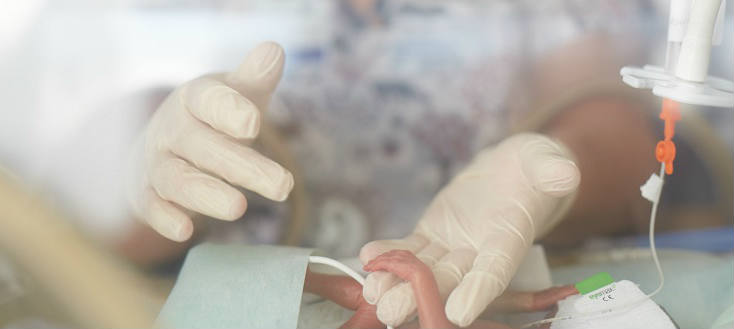
Baby Abigail was born at 22 weeks’ gestation, weighing barely over a pound.
In the isolette, a tiny, week-old baby lifts her index finger-sized arm. Baby Abigail weighs 498 grams – barely over a pound. She was born four months early, at 22 weeks, 6 days’ gestation.
Extremely premature babies like Abigail are at high risk of dying, regardless of medical intervention, and of having neurodevelopmental and other physical disabilities. A few years ago, those born at 22 weeks generally received palliative care, and passed away naturally after birth. However, the hospital has a new approach based on research and discussion with parents.
Abigail’s mother, Dena Larabie, was informed of the risks and potential developmental issues that extreme preemies face.
“I was told that, being born at 22 weeks, her rate of survival is low but possible,” said Larabie. She was part of a shared decision-making process, new to The Ottawa Hospital. As a result, she chose to have Abigail receive intensive care, with hope that she would survive.
When neonatologist Dr. Gregory Moore returned after working for a year at a hospital in Melbourne, Australia, he noted that extreme preemies in Australia were reported to have better survival and lower neurodevelopmental disability rates than those quoted by neonatologists at The Ottawa Hospital. He wondered why, considering the similar level of care in Melbourne. He noted that the neurodevelopmental disability rates used here were based on one study from Britain. Dr. Moore felt this wasn’t enough information.
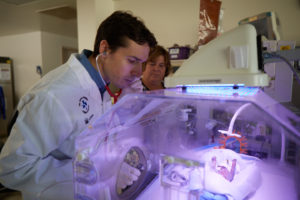
Dr. Gregory Moore, a neonatologist at The Ottawa Hospital and CHEO, and an Assistant Professor at the University of Ottawa, examined a baby born at 22 weeks’ gestation. “The NICU team at The Ottawa Hospital may attempt intensive care for some infants born as early as 22 weeks if the parents strongly believe that it’s in their infant’s best interests,” he said. “We also very much support parents who choose palliative care.”
“Along with some colleagues, I put together a systematic review of published literature that followed babies born between 22 and 25 weeks who were alive at school age, and examined certain neurodevelopmental disabilities,” said Dr. Moore. “The studies looked at the children’s cognitive abilities, their IQ test scores; how they think, talk and communicate; their motor skills, such as how well they walk; and their likelihood of blindness and deafness.”
His research showed these extreme preemies ended up doing better than what was noted in the British study. Other research showed that other factors affect how well a baby does, such as greater birth weight and mothers who received antenatal steroids.
“It made us realize that some babies born at 22 or 23 weeks could do better than some babies born at 24 or 25 weeks, depending on the various factors,” said Dr. Moore.
He led a 16-person interdisciplinary working group of neonatologists, nurses, an ethicist, social worker, and parents, to create a shared decision-making guideline and a tool. These help parents make informed decisions about whether they want their extremely premature baby to receive intensive care or palliative care. The shared decision-making approach ensures that the family’s life experience, culture, religion, and values play major roles. The medical team explains the statistics and prognosis regarding survival and neurodevelopmental disabilities to the family. This gives them an idea of what they could face if their child survives and has disabilities. The goal is to give parents truthful and accurate information, so that they are fully informed before making a decision.
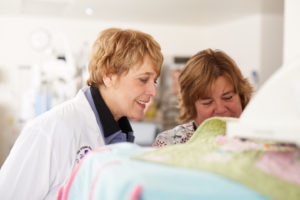
NICU Clinical Manager Janet Brintnell discussed care of a baby born at 22 weeks’ gestation with Registered Nurse Joanne Major.
Not long after the team implemented the shared decision-making process, a baby was born at 22 weeks’ gestation, and the parents asked the NICU team to try intensive care to help their baby.
“We didn’t really know how to care for this baby, as we’d never cared for one this premature,” said Janet Brintnell, Corporate Clinical Manager for the Neonatal Intensive Care Unit and the Special Care Nursery. “These extreme preemies are at risk for so much. Their skin is so fragile. Even our sheets are too rough for their skin. We didn’t know the extent of the care needs these tiny babies had.”
Sadly, the baby lived only a short time, but the family was thankful that the NICU team had made such efforts, and was grateful to have been a part of their child’s brief life.
“We identified a whole bunch of issues and that made us work really hard to ensure the best possible conditions for these babies,” said neonatologist Dr. Brigitte Lemyre. “Before these guidelines, we had no survivors under 23 weeks because we almost never attempted resuscitation. Now, if some parents wish, after hearing all the information, we do attempt resuscitation and intensive care.”
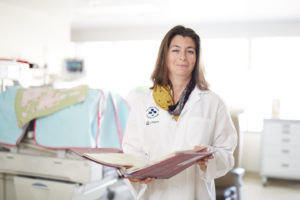
“Since the guideline, we have had two babies survive at 22 weeks’ gestation, which was previously unheard of here in Ottawa,” said neonatologist Dr. Brigitte Lemyre. “They are both home and doing well, though it is too early to determine their neurodevelopmental outcome. One is 18 months. The other is 11 months.”
“Since the guideline, we have had two babies survive at 22 weeks’ gestation, which was previously unheard of here in Ottawa,” said neonatologist Dr. Brigitte Lemyre. “They are both home and doing well, though it is too early to determine their neurodevelopmental outcome. One is 18 months. The other is 11 months.”
Brintnell said that what they learned has helped them develop better treatment plans, which resulted in them seeing an improvement in the 25- to 26-week-old preemies. Improving the care for the smallest has improved the care for the bigger babies.
“In the end, we’ve changed from some black-and-white decisions based on gestational age to a prognosis-based approach,” said Dr. Moore. “Families are prepared and that’s the purpose of shared decision-making.” He has spoken about these practices at conferences. Other hospitals are now looking to The Ottawa Hospital for guidance in treating babies less than 25 weeks.
Though her chance of survival is uncertain, if all goes well, baby Abigail will be in the NICU until her due date in March 2018, then go home to her family.
The Ottawa Hospital is raising funds to renovate its NICU, which is critical for babies like Abigail to receive the most up-to-date treatments to give them the best chance at surviving, thriving and growing up.

Support patient care and research at
The Ottawa Hospital
You might also like…
Watch: NICU babies and staff receive special Challenge Coins from Ottawa Fire Services
This may be the feel-good video of the year! After helping carry our tiniest patients out of harm’s way on October 27, firefighters return to the General Campus NICU to present staff, families and babies with a special gift.
The Ottawa Hospital administers world-first in-utero treatment for rare genetic disorder
Before Ayla was born, she had already made history. Last year at The Ottawa Hospital, she received a world-first in-utero treatment for Pompe disease, a rare genetic disorder that had taken the lives of two of her siblings. Now 17 months old, Ayla is healthy and happy.
How patients and family members are helping to infuse pride into The Ottawa Hospital’s DNA
Learn about four initiatives spearheaded by our Rainbow Patient and Family Advisory Committee (PFAC) that are helping to create safer spaces for the 2SLGBTQ+ community.
How to talk to your doctor: Tips to make difficult conversations a little easier
Do you ever feel nervous about talking to your doctor? A doctor and a patient advisor from The Ottawa Hospital share practical tips to help make difficult conversations a little bit easier.
Giving every COVID-19 patient the chance to participate in research
Since the beginning of the pandemic, Irene and Rebecca have been on the front lines explaining all the available clinical trials to these patients and their families, often during those first difficult days of hospitalization.
Patient gets life-changing diagnosis thanks to Open Science
For years, doctors thought Jenna Keindel had limb-girdle muscular dystrophy, even though they couldn’t find the exact gene that was causing the disease. This all changed when Jenna read a research article about an autoimmune disorder that mimicked muscular dystrophy – sending her life, and diagnosis, on an entirely new path.


 To reset, hold the Ctrl key, then press 0.
To reset, hold the Ctrl key, then press 0.
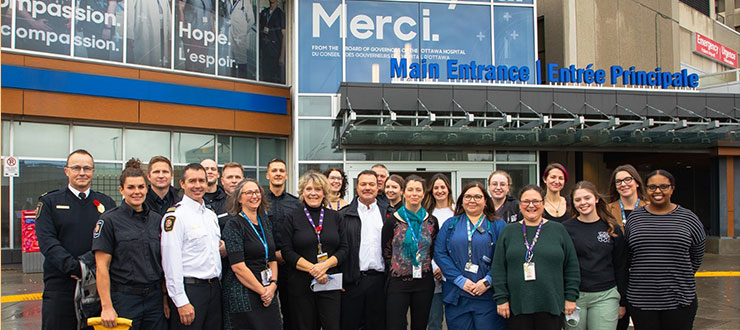
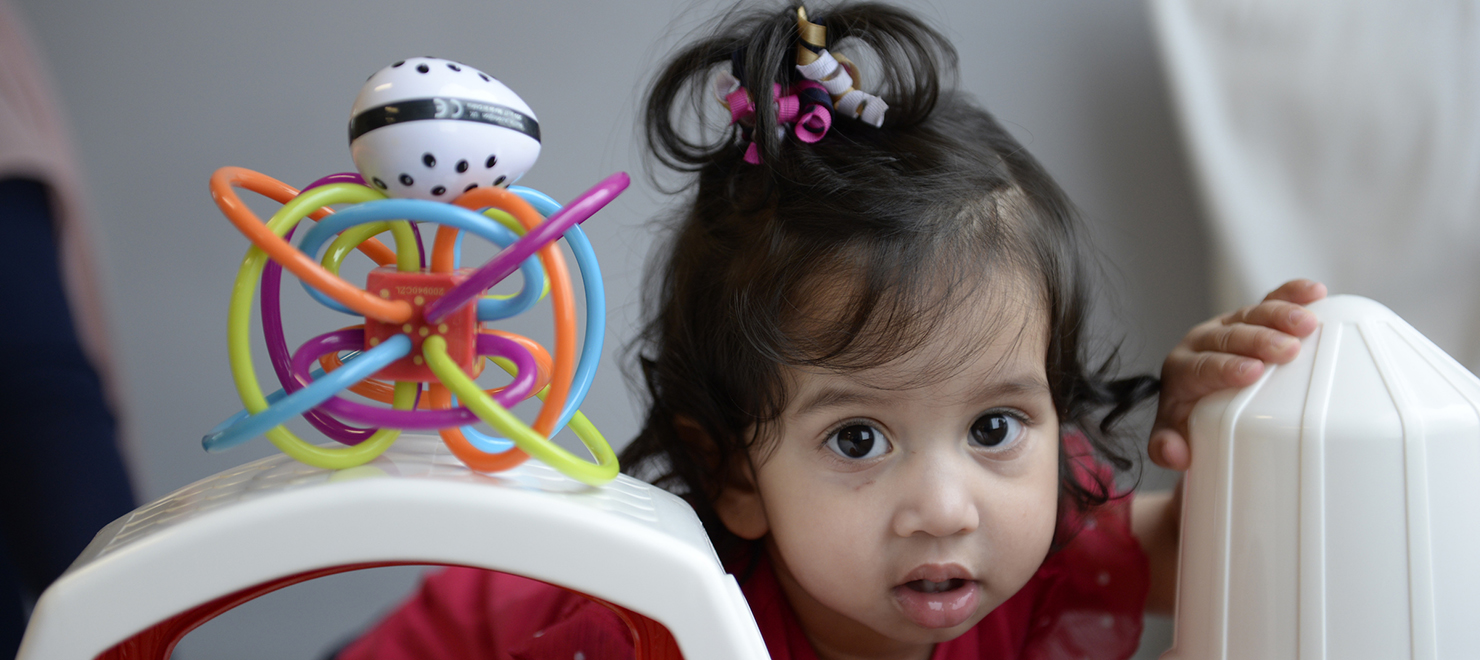

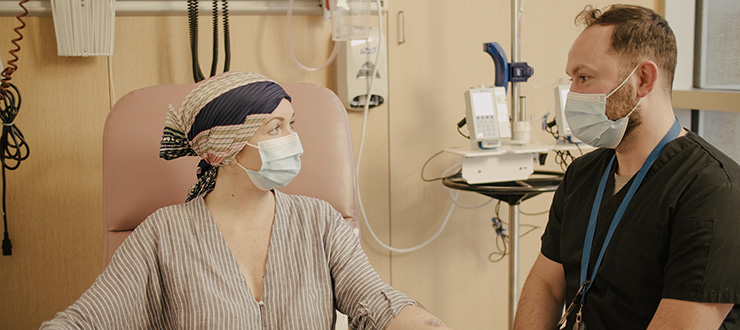
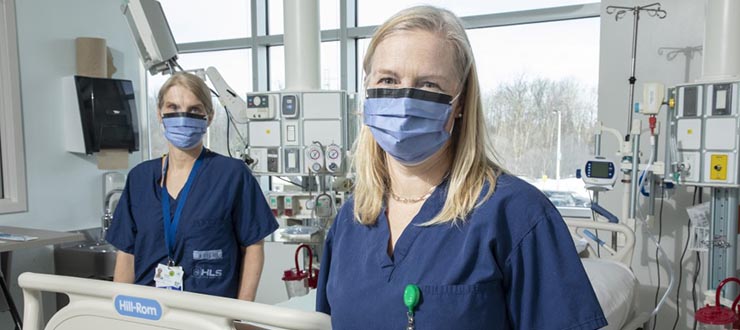
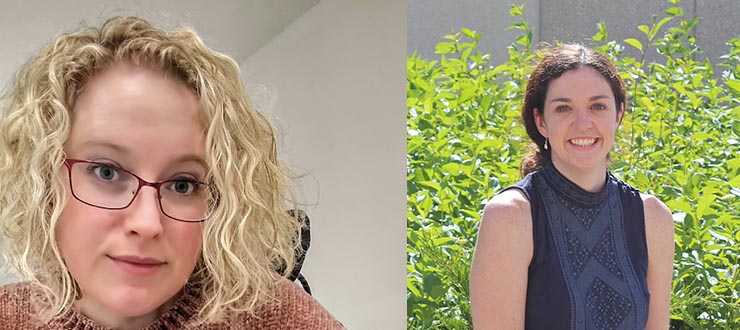
Comment on this post